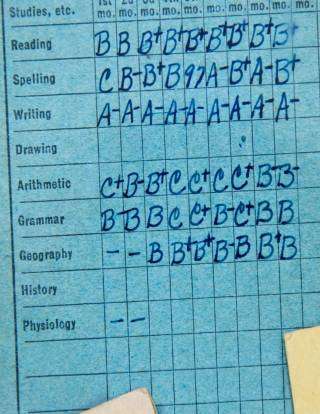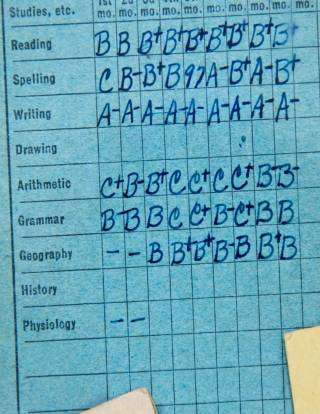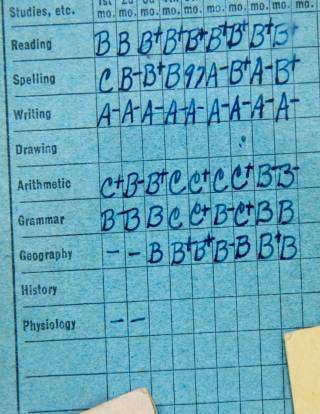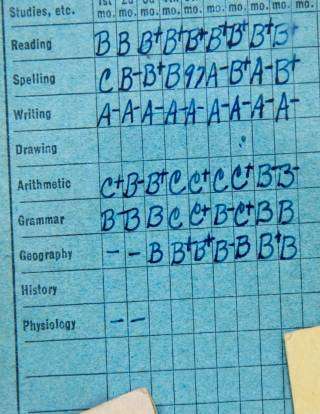Overall Performance and Improvement
Positive Comments:
-
___________ has a good attitude towards the math work at this grade level. Please continue to work on ___________ daily.
-
At this point, ___________ has successfully learned _____________. [He/she] is now able to start a daily practice of ____________.
-
___________ has a true enthusiasm and gift for math. His effort is reflected in his high grades. He is also an excellent classmate, as he frequently assists other students with concepts.
-
___________ has shown impressive progress in understanding complex math concepts. [His/her] consistent effort is commendable.
-
___________ has shown a clear improvement in [his/her] math skills this term. The consistent practice is paying off, keep it up!
-
___________ displays a positive approach towards problem-solving tasks in math. [His/her] willingness to tackle challenging problems is noteworthy.
Needs Improvement Comments:
-
___________ has worked hard in math this quarter. However, [his/her] progress has been slower than I would have liked. Can we meet to discuss some helpful strategies?
-
___________ would benefit from more practice with ___________. If possible, could you please spend some time daily on this skill?
-
It would be helpful if ___________ practiced _______________ daily.
-
___________ is struggling with motivation in learning math. I know [he/she] can put in more effort than [he/she] has been recently. If possible, could you please reinforce this?
-
___________ still needs strengthening in the concept of ___________.
-
___________ is having trouble with many of the basic math skills. Can we meet to discuss some helpful strategies?
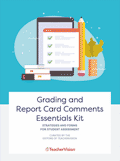
Looking for more report card comment examples?
Download or purchase over 90+ pages of grading comments examples, tips, and advice for managing student grades.
View more examplesUnderstanding of Concepts
Positive Comments:
-
___________ shows excellent understanding of mathematical concepts, which is reflected in [his/her] problem-solving abilities.
-
___________ consistently demonstrates a deep comprehension of all math topics we've covered.
-
___________ has a strong grasp of mathematical concepts and can apply them creatively in different contexts.
-
___________ demonstrates a robust understanding of concepts, consistently making connections between different areas of math.
-
___________ effectively translates their understanding of mathematical concepts into accurate and efficient problem-solving.
Needs Improvement Comments:
-
___________ often struggles to apply mathematical concepts to solve problems. Additional practice could be beneficial.
-
___________ seems to have difficulty understanding some of the math concepts we've covered. Extra support may be helpful.
-
___________ frequently makes mistakes that indicate a misunderstanding of key math concepts.
-
___________ has trouble relating mathematical concepts to real-world applications. More practice in this area could be beneficial.
-
___________ often seems confused when trying to apply math concepts during problem-solving. Additional review and practice might help solidify understanding.
Problem Solving Skills
Positive Comments:
-
___________ consistently demonstrates strong problem solving skills in math.
-
___________ effectively applies various strategies to find solutions to complex math problems.
-
___________ shows a clear ability to break down problems and work through them step by step.
-
___________ often comes up with multiple approaches to solve a single problem, showing great flexibility in [his/her] thinking.
-
___________ consistently shows perseverance in solving challenging problems and doesn't give up easily.
Needs Improvement Comments:
-
___________ often struggles when faced with complex math problems and could benefit from extra practice.
-
___________ tends to give up quickly when faced with challenging problems. Encourage perseverance and trying different strategies.
-
___________ often overlooks important details in problems, leading to incorrect solutions. More careful reading and analysis could be beneficial.
-
___________ struggles with applying learned strategies to new problems. Continued practice is needed.
-
___________ has difficulty in breaking down complex problems into smaller, manageable steps. Working on this skill could improve [his/her] problem-solving abilities.
Arithmetic and Operations
Positive Comments:
-
___________ demonstrates strong skills in arithmetic and handles complex operations with ease.
-
___________ has shown impressive improvement in arithmetic operations this term. Keep up the good work!
-
___________ has a solid understanding of basic arithmetic concepts and applies them correctly in problem-solving.
-
___________ is able to accurately perform arithmetic operations, even under time pressure.
-
___________ excels in arithmetic operations and consistently produces accurate results.
Needs Improvement Comments:
-
___________ often makes errors in arithmetic calculations. More practice would be beneficial.
-
___________ struggles with complex arithmetic operations and could benefit from additional support.
-
___________ has difficulty remembering the steps in long division. Continued practice at home would be helpful.
-
___________ struggles with basic arithmetic operations. Regular practice will help reinforce these skills.
-
___________ tends to rush through arithmetic operations, leading to errors. Encourage them to take their time and double-check [his/her] work.
Arithmetic and Operations — Elementary School Comments
-
At this point, ___________ has successfully learned all of the addition facts through ten. [He/she] is now able to start regular practice of the subtraction facts through ten.
-
___________ has done well learning the multiplication table.
-
___________ understands the plus, minus, and equal signs, and uses them to make number statements.
-
___________ understands and uses basic facts of addition and subtraction.
-
___________ can use manipulatives to add and subtract.
-
___________ can [add/subtract/multiply/divide] basic fractions.
-
However, it would be helpful if ___________ practiced [his/her] multiplication facts regularly.
-
___________ has difficulty retaining math processes of addition, etc.
Arithmetic and Operations — Middle School Comments
-
___________ understands basic equations and can solve for one variable.
-
___________ understands basic equations and can solve for multiple variables.
-
___________ can [add/subtract/multiply/divide] advanced fractions and mixed numbers.
-
___________ understands and can solve [pre-algebraic/algebraic] expressions and equations.
-
___________ exhibits proficiency in using order of operations to simplify expressions.
-
___________ is successful at applying properties of operations when simplifying algebraic expressions.
-
___________ struggles with understanding the concept of ratios and proportional relationships.
-
___________ is showing improvement in solving real-world math problems involving percentages.
Numbers and Number Sense
Positive Comments:
-
___________ has a solid understanding of number concepts and applies them effectively.
-
___________ uses number sense to solve problems and justify solutions effectively.
-
___________ demonstrates a strong ability to identify and work with number patterns.
-
___________ has made significant progress in understanding and applying number concepts.
-
___________ consistently shows a clear understanding of place value in [his/her] work.
Needs Improvement Comments:
-
___________ is having difficulty understanding the concept of place value.
-
___________ struggles with identifying and working with number patterns.
-
___________ needs to work on [his/her] understanding of number concepts and their application.
-
___________ often confuses number facts and needs to practice more.
-
___________ needs to improve [his/her] ability to use number sense in problem-solving.
Numbers and Number Sense — Elementary School Comments
-
___________ can work with numbers up to ___ with understanding.
-
___________ is still reversing some numbers.
-
___________ understands place value up to _____.
-
___________ can use manipulatives to show place value to _____.
-
___________ can count to ______.
-
___________ relies heavily on concrete objects.
-
___________ is beginning to memorize the number facts.
-
___________ does not know [his/her] math facts well.
Numbers and Number Sense — Middle School Comments
-
___________ understands and can represent [basic/intermediate/advanced] fractions.
-
___________ understands the basic concepts of decimal notation.
-
___________ understands and can [add/subtract/multiply/divide] using decimal notation.
-
___________ knows how to identify and work with number patterns.
-
___________ demonstrates proficiency in the use of scientific notation.
-
___________ shows excellent understanding of square roots and exponents.
-
___________ is skilled in rounding and estimating large numbers.
-
___________ effectively applies the principles of probability in problem-solving scenarios.
Money and Measurement
Positive Comments:
-
___________ has shown a deep understanding of the concepts of money and measurement. [He/She] can accurately use different units of measurement and understand the value of different currencies.
-
___________ has done exceptionally well in understanding and applying the concept of measurements in practical situations.
-
___________ shows a strong ability to convert between different units of measurement.
-
___________ has demonstrated a strong understanding of the value of money and can make accurate calculations involving money.
-
___________ has a solid grasp on time measurements and can accurately tell the time using both digital and analog clocks.
Needs Improvement Comments:
-
___________ is struggling with the concept of measurements; further practice and understanding are required.
-
___________ needs to work on understanding the value of money and how to calculate with it.
-
___________ often confuses units of measurement and could benefit from additional practice.
-
___________ has difficulty with time measurements and could use more practice reading clocks.
-
___________ struggles with applying measurement concepts in practical scenarios and could benefit from additional real-world examples.
Money and Measurement — Elementary School Comments
-
___________ understands the basics of money and coins (pennies, dimes, nickels).
-
___________ understands the types of currency (pennies, dimes, nickels, quarters, dollars).
-
___________ understands how to use coins and bills of different denominations to pay for items and make change.
-
___________ understands and can use basic units of measure for length, width, and height, including [inches/feet/centimeters/meters].
-
___________ understands and can use basic units of measure for volume, mass, and weight, including [ounces/pounds].
-
___________ understands and can use basic units of measure for distance of travel [and/or} time, including [feet/yards/miles, seconds/minutes/hours].
-
___________ understands and can use basic units of measure for temperature, including [Fahrenheit].
-
___________ knows how to tell time by reading a clock, and can effectively use seconds, minutes, and hours to describe time.
-
___________ can use a ruler to measure [inches/feet/yards].
-
___________ effectively uses common measurement tools including [ruler, protractor, scale, thermometer, clock] to solve measurement problems.
Money and Measurement — Middle School Comments
-
___________ understands the basics of financial literacy and the role of currency in personal and economic affairs.
-
___________ understands and can use basic units of measure for length, width, and height, including [meters].
-
___________ understands and can use basic units of measure for volume, mass, and weight, including [tons/kilograms].
-
___________ understands and can use basic units of measure for distance of travel [and/or} time, including [kilometers, hours].
-
___________ understands and can use basic units of measure for temperature, including [Centigrade].
-
___________ can use a ruler to measure [milimeters/centimeters/meters].
-
___________ has learned how to convert U.S. measurements to metric measurements, including [milimeters/centimeters/meters/kilometers, kilograms, Centigrade].
Geometry
Positive Comments:
-
_______ has a strong understanding of geometric concepts and applies them effectively in problem-solving.
-
_______ shows an impressive ability to identify and work with shapes and angles.
-
_______ demonstrates a keen understanding of [2D and/or 3D] shapes.
-
_______ excels in applying geometric principles to real-world problems.
-
_______ consistently demonstrates a clear understanding of [area/perimeter/volume].
Needs Improvement Comments:
-
_______ often confuses different types of angles and shapes. More practice would be beneficial.
-
_______ is struggling with the concept of volume and could benefit from additional exercises.
-
_______ has difficulty understanding and applying the concept of area.
-
_______ struggles with identifying and applying geometric principles in problem-solving tasks.
-
_______ often makes errors when trying to calculate the perimeter of complex shapes.
Geometry — Elementary School Comments
-
_______ knows the basic shapes.
-
_______ understands the differences between 2-dimensional and 3-dimensional shapes.
-
_______ knows the basic angles and types of triangles.
-
_______ understands the basic concept[s] of [area/perimeter].
-
_______ understands the basic concept[s] of [volume/mass].
-
_______ understands and can use the basic concept[s] of [area/perimeter] to solve problems.
-
_______ understands and can use the basic concept[s] of [volume/mass] to solve problems.
Geometry — Middle School Comments
-
_______ understands and can use the basic concept[s] of [points/lines] to solve problems.
-
_______ understands and can use advanced geometric concepts to solve problems.
-
_______ demonstrates a strong ability to identify, compare, and analyze shapes and their properties.
-
_______ excels in calculating the area and volume of complex geometric figures.
-
_______ can apply the principles of symmetry, congruence, and similarity in geometric problems.
-
_______ displays a deep understanding of coordinate plane concepts and can plot points accurately.
-
_______ is proficient in using geometric formulas and theorems to solve algebraic equations.
Graphs and Charts
Positive Comments:
-
_______ can create graphs using simple data.
-
_______ understands several methods of graphing.
-
_______ can effectively synthesize and present complex data in [bar graphs, line graphs, pie charts, visualizations, tables], and explain correlations.
-
_______ skillfully interprets graphical data and uses it to inform problem-solving strategies.
-
_______ exhibits a strong ability to construct and analyze scatter plots and understands their relationship with linear equations.
Needs Improvement Comments:
-
_______ often struggles with interpreting data from graphs and charts. Working on this at home would be beneficial.
-
_______ needs to improve [his/her] ability to construct accurate and meaningful graphs from given data.
-
_______ frequently has difficulty understanding the correlation between variables in a scatter plot. More practice with this concept would be helpful.
-
_______ should work on using graphs and charts effectively to support problem-solving strategies.
-
_______ has trouble creating pie charts and bar graphs accurately. Continued practice in this area is needed.
Participation in Class
Positive Comments:
-
___________ actively participates in all class discussions and regularly contributes valuable insights.
-
___________ is always eager to answer questions in class, showing a great understanding of the subject.
-
___________ often takes the lead in group activities, demonstrating strong leadership skills.
-
___________ consistently engages with the lesson and asks thoughtful questions.
-
___________ effectively collaborates with peers during group work, demonstrating team spirit.
Needs Improvement Comments:
-
___________ rarely participates in class discussions. Encouraging more active engagement would be beneficial.
-
___________ often hesitates to ask questions, even when struggling with a concept. Remind them that asking for clarification is part of learning.
-
___________ tends to work alone during group activities. Encouraging teamwork might enhance their learning experience.
-
___________ often seems distracted during class. Focusing on the lesson can significantly improve their understanding.
-
___________ seldom contributes to class discussions. More active participation would be beneficial.
Work Habits
Positive Comments:
-
___________ shows a strong interest in math and actively engages in-class activities.
-
___________ regularly contributes to class discussions with insightful questions and comments.
-
___________ demonstrates a solid understanding of math concepts during group work and discussions.
-
___________ takes initiative to help others understand difficult math concepts.
-
___________ consistently completes math assignments on time and shows a high level of dedication.
Needs Improvement Comments:
-
___________ rarely engages in math-related discussions. Encourage more active participation.
-
___________ often appears distracted during math lessons. More focus would be beneficial.
-
___________ struggles to meet deadlines for math assignments. Better time management could help.
-
___________ rarely asks for help, even when struggling with math concepts. Encourage asking questions.
-
___________ tends to work independently, even during group activities. More teamwork is needed.
Use of Tools and Strategies
Positive Comments:
-
___________ effectively uses a variety of tools and strategies to solve math problems.
-
___________ consistently applies learned strategies to new math challenges.
-
___________ demonstrates a strong ability to choose suitable tools for different math tasks.
-
___________ is adept at using technology to enhance [his/her] understanding in math.
-
___________ skillfully applies a range of strategies to understand complex math concepts.
Needs Improvement Comments:
-
___________ struggles with selecting the appropriate strategy for problem-solving tasks.
-
___________ could benefit from a wider range of strategies to approach math problems.
-
___________ often relies on one strategy, even when it may not be the most efficient.
-
___________ has difficulty in using mathematical tools effectively.
-
___________ could improve in utilization of technology to aid in understanding math.










